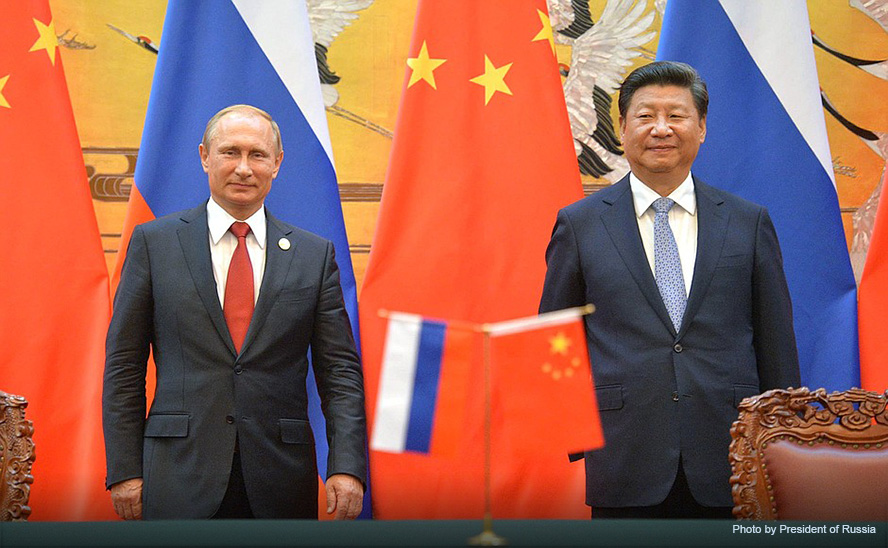
China-Russia relations have progressed steadily since the end of the Cold War. Today, Moscow and Beijing explicitly consider themselves crucial strategic partners whose solid bilateral relations not only serve the two countries' immediate interests but also provide reliable guarantee of international strategic balance and peace. One can also talk about a China-Russia joint front within important international institutions after Moscow and Beijing jointly vetoed four US-backed resolutions on Syria in the UN Security Council. Simultaneously, the depth and geographic scope of China-Russia joint military exercises increased considerably after the Russian and Chinese Navies conducted their joint naval drills in the Mediterranean in 2015and in the disputed South China Sea in 2016.Even in Central Asia, which was expected to become an arena of China-Russia confrontation, the two countries sought to achieve an understanding by signing on May 8, 2015, a Joint Statement that links China's Silk Road Economic Belt with the Russia-led Eurasian Economic Union. All these visible and widely-discussed developments undoubtedly reveal a stable upward trend in China-Russia relations.
However, there has been another, less visible, but crucially important transformation reflecting the ongoing transition of China-Russia cooperation into a new level a shift from post factum consultations to pre factum coordination. This shift indicates the emergence of a proactive rather than a reactive approach in China-Russia cooperation, when Moscow and Beijing go beyond simple announcements of shared views after and in response to various contingencies of international politics and, in fact, start practicing coordinative consultations before important international events or meetings with other governments. This new trend underlines an important aspect of the institutionalisation of post-Cold War China-Russia relations that facilitates strategic coordination.
The actual materialisation of the new shift roughly started with the signing of several bilateral documents, such as China-Russia Joint Statement on a New Stage of Comprehensive Strategic Partnership of Coordination, signed in 2014, in which coordination, rather than simply cooperation, has become a new key word. Simultaneously, the mechanism of China-Russia bilateral consultation has developed into a multilevel infrastructure of contacts among almost all government agencies, whereas top decision makers Vladimir Putin and Xi Jinping have met 25 times since Xi took office in 2013 so as the words of greetings by both evolved from dear President to dear friend and later to my old friend.The resultant joint statements or declarations now not only reflect the two countries' shared views on the existing international problems but also spell out relatively detailed, future-oriented plans of how China and Russia will actually work together to deal with them. A good share of those problems is related to China-Russia joint resistance against the growing American threat and, more specifically, such issues as American National Missile Defense (NMD) program, the THADD in South Korea, the American pivot to Asia, NATO's eastward expansion, as well as the danger of color revolutions in Central Asia.
In this context, China and Russia are outlining potential collective security arrangements in Asia and elsewhere. A good example in point is the launch in 2015 of the China-Russia Northeast Asia Security Dialogue, which has become a new platform for regional security consultations aimed at creating effective security mechanisms in Northeast Asia. Being the most tightly scheduled format of bilateral consultations with frequency of meetings at times reaching bimonthly schedule, the new Dialogue focuses on the creation of effective security architecture for the future and on how China and Russia must consolidate mutual coordination to better deal with future threats.
Another important case in point is Xi Jinping's visit to Moscow on 3 July 2017 just few days before the G-20 summit in Hamburg where both Xi and Putin had scheduled meetings with the American President Donald Trump. Such visit indicates that Xi and Putin prefer to touch base before each of them meet separately with the American President. In a joint statement announced at the end of Xi's Moscow trip China and Russia not only urged North Korea to stop all missile tests but also called on Washington to immediately halt deployment of its THAAD anti-missile system in South Korea and end large-scale military drills in the region.
While China and Russia are not formal allies, their increased policy coordination and elaboration of common grounds during peacetime is likely to enhance the reliability and credibility of their strategic partnership in dealing with various global and regional challenges, peaceful or warlike.